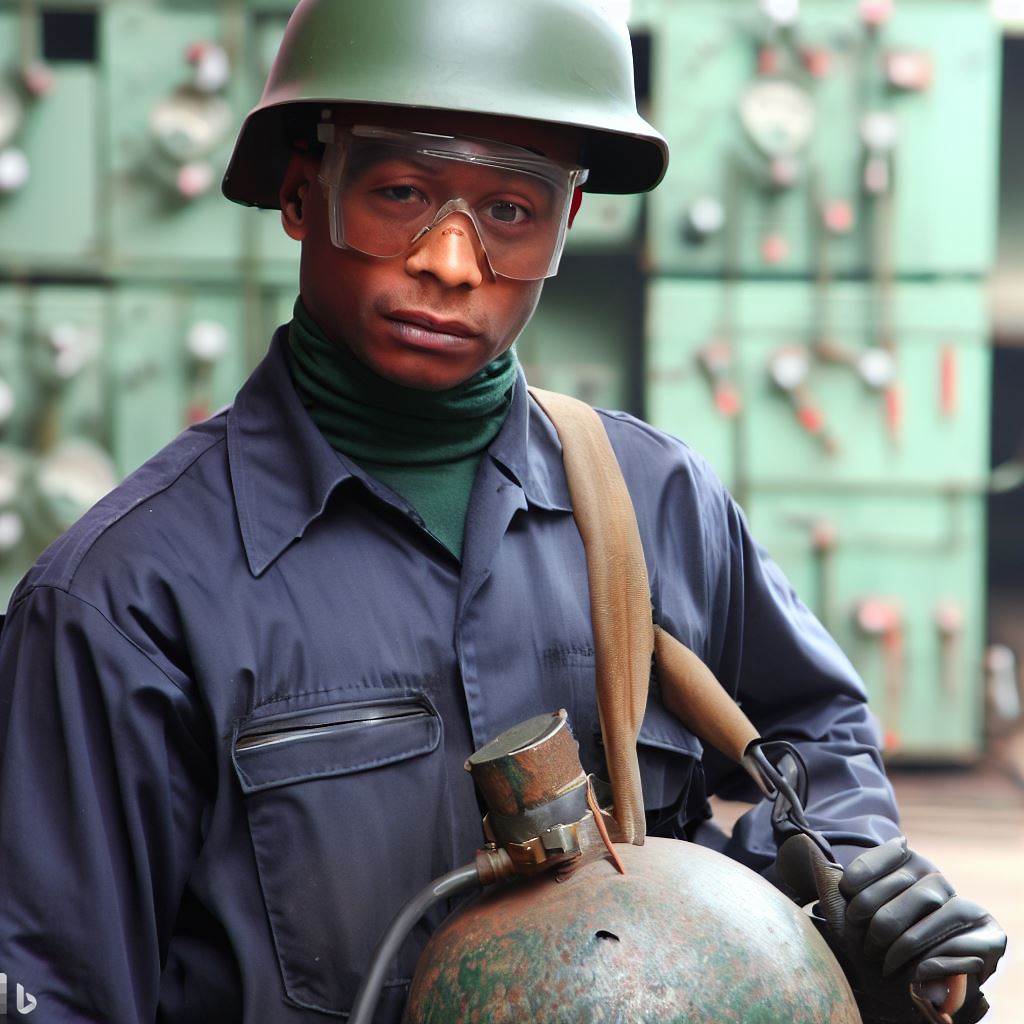Introduction
Nigeria, a country known for its rich cultural heritage and abundant natural resources, has also made significant strides in modern bomb disposal techniques.
With the emergence of modern approaches, the country has been able to enhance its capability in dealing with explosive devices.
Modern approaches for bomb disposal are crucial in today’s world. Traditional methods have proven to be inadequate against the evolving threat posed by terrorists and criminal organizations.
Therefore, Nigeria has adopted modern techniques to address these challenges and ensure the safety of its citizens.
This blog post aims to explore Nigeria’s modern bomb disposal techniques and shed light on their significance.
By incorporating state-of-the-art technology and training, Nigeria has been able to improve its ability to detect, neutralize, and dispose of explosive devices in a safe and efficient manner.
One of the key modern approaches employed by Nigeria is the use of advanced bomb disposal robots. These robots can navigate hazardous environments and disarm explosive devices remotely.
They provide an invaluable tool for bomb disposal experts, minimizing the risk of injury or fatalities.
Furthermore, Nigeria has invested in training bomb disposal personnel to handle and defuse improvised explosive devices (IEDs).
By equipping these specialists with the latest knowledge and techniques, Nigeria can effectively neutralize threats and prevent potential disasters.
In fact, Nigeria’s modern bomb disposal techniques play a crucial role in safeguarding its citizens and maintaining national security.
By embracing advanced technologies and continuous training, Nigeria remains at the forefront of combating explosive threats.
Historical context of bomb disposal in Nigeria
Overview of Nigeria’s struggle with terrorism
- Nigeria has been facing significant challenges with terrorism for several decades.
- The emergence of Boko Haram in the early 2000s further intensified the threat.
- The terrorist group has carried out numerous bombings, targeting civilians, government buildings, and military installations.
- This relentless wave of bombings necessitated the development of effective bomb disposal techniques.
Early bomb disposal techniques used in Nigeria
- In the early years, bomb disposal units in Nigeria heavily relied on international support and expertise.
- Training programs were established, and Nigerian personnel were sent abroad to acquire skills in bomb disposal.
- These early techniques mainly focused on conventional bomb disposal methods, such as manual defusing.
- However, as the threat evolved, more sophisticated approaches became necessary.
Limitations and challenges faced by bomb disposal units in the past
- One significant challenge was the lack of adequate equipment and specialized tools for bomb disposal.
- Due to budget constraints and limited resources, bomb disposal units faced difficulties in acquiring advanced technology.
- Moreover, the constantly evolving nature of bomb-making techniques posed challenges for detection and defusal.
- Furthermore, coordinating with other security agencies and intelligence units was often a complex and time-consuming process.
Despite these limitations, Nigeria has continuously worked towards improving its bomb disposal capabilities, incorporating modern approaches.
With the rise of new technologies and global collaboration, Nigeria’s bomb disposal units have made significant progress.
The Nigerian military, alongside international partners, has been instrumental in enhancing bomb disposal techniques.
The introduction of specialized bomb disposal robots and equipment has greatly improved the efficiency and safety of operations.
These robots are capable of remotely surveying and disabling explosive devices, minimizing the risk to human life.
Additionally, Nigeria has established a dedicated Bomb Data Center to analyze and share intelligence on explosive devices.
The center plays a crucial role in identifying patterns, understanding tactics, and developing effective countermeasures.
Training programs have also been expanded, ensuring that Nigerian bomb disposal personnel receive comprehensive education and continuous skill development.
International collaborations have played a significant role, providing Nigerian bomb disposal units with access to advanced technologies and best practices.
Efforts are ongoing to strengthen inter-agency cooperation and intelligence sharing to respond effectively to the evolving threat landscape.
Overall, Nigeria’s bomb disposal techniques have evolved significantly, aligning with modern approaches and global advancements.
In a country facing persistent terrorist activities, the continuous development of bomb disposal capabilities remains crucial.
By enhancing training, acquiring advanced technology, and fostering international partnerships, Nigeria will be better equipped to tackle future threats.
Read: Top Schools for Bomb Disposal Training in Nigeria
Evolution of bomb disposal techniques in Nigeria
Introduction of advanced technology in bomb disposal
The Nigerian government has made significant strides in upgrading bomb disposal technology. State-of-the-art equipment such as bomb suits, robots, and X-ray machines have been introduced.
These advanced tools enhance the safety of bomb disposal personnel and improve efficiency.
Training and collaboration with international experts
- Nigerian bomb disposal units have collaborated with international experts to enhance their capabilities.
- Joint training exercises have been conducted with bomb disposal units from other countries.
- This exchange of knowledge and experience has helped Nigeria in adopting modern bomb disposal techniques.
Examples of modern bomb disposal techniques utilized in Nigeria
1. Remote-controlled robots
- Bomb disposal units in Nigeria use remotely-operated robots to handle suspicious packages or devices.
- These robots can perform tasks such as inspection, detonation, and disposal.
- They are equipped with cameras, manipulator arms, and tools to handle different types of explosive devices.
2. X-ray technology
- X-ray machines are utilized to scan suspicious objects or packages without physically touching them.
- These machines can detect hidden explosives or components inside objects.
- This non-intrusive technique helps bomb disposal experts assess the level of threat and plan accordingly.
3. Bomb suits and protective gear
- Bomb disposal personnel in Nigeria are equipped with specialized suits and protective gear.
- These suits are designed to withstand the impact of an explosion and minimize injuries.
- They also have integrated cooling systems to provide comfort to the operatives during long operations.
4. Robots with disruption tools
- Bomb disposal robots in Nigeria are equipped with disruption tools such as water disruptors.
- These tools can disrupt explosive devices by using controlled water blasts.
- This technique neutralizes the threat without causing a detonation.
5. Chemical detection equipment
- Nigerian bomb disposal units utilize chemical detection equipment to identify explosive substances.
- These devices can detect trace amounts of explosives, helping experts identify potential threats.
- This enables targeted and effective disposal techniques to be applied.
In general, Nigeria’s bomb disposal techniques have evolved significantly through the introduction of advanced technology, training, and collaboration with international experts.
The utilization of modern bomb disposal techniques such as remote-controlled robots, X-ray machines, bomb suits, disruption tools, and chemical detection equipment has improved the safety and effectiveness of bomb disposal operations in Nigeria.
Read: Challenges and Risks in Nigeria’s Bomb Disposal Industry

The role of specialized bomb disposal units
Establishment and organization of Nigeria’s bomb disposal units
- Nigeria has established specialized bomb disposal units to handle the threat of explosive devices.
- These units are organized within law enforcement agencies and the military to ensure efficiency.
- The establishment of bomb disposal units highlights the seriousness with which Nigeria treats the issue of explosives.
- These units work closely with intelligence agencies to gather information and track down potential threats.
Training and qualifications required for bomb disposal experts
- Bomb disposal experts undergo rigorous training to develop the necessary skills and knowledge.
- The training includes theoretical and practical components to prepare experts for real-world scenarios.
- They are required to have a solid understanding of various types of explosive devices and their components.
- Experts also receive specialized training on different bomb disposal techniques and equipment.
- Continuous education and professional development are essential for bomb disposal experts to stay updated with evolving threats.
Duties and responsibilities of bomb disposal units
- Bomb disposal units are responsible for the safe identification, neutralization, and disposal of explosive devices.
- They analyze the composition and potential impact of a device to determine the appropriate course of action.
- Units use advanced technology, such as bomb disposal robots, to handle dangerous situations remotely.
- Bomb disposal experts work closely with other security agencies during high-risk operations.
- They also provide training and guidance to other law enforcement personnel on bomb threat awareness and response.
In essence, the establishment of specialized bomb disposal units in Nigeria plays a crucial role in ensuring public safety.
These units are organized within law enforcement agencies and the military and require experts who undergo rigorous training and possess the necessary qualifications.
Bomb disposal units have the responsibility of identifying, neutralizing, and disposing of explosive devices using advanced techniques and equipment.
Their collaboration with other security agencies is essential in effectively dealing with potential threats.
Continuous education and professional development are crucial for bomb disposal experts to stay ahead of evolving threats and protect the nation from the devastating consequences of explosives.
Read: Day in the Life: A Nigerian Bomb Disposal Expert’s Job
Modern approaches to bomb detection
Introduction to specialized bomb detecting equipment
- Specialized bomb detecting equipment plays a crucial role in Nigeria’s modern bomb disposal techniques.
- These devices are designed to detect explosives, such as dangerous chemicals or suspicious packages.
- X-ray systems are used to scan luggage, vehicles, and other objects to identify potential explosive materials.
- Advanced metal detectors are employed to identify metallic components commonly found in bombs.
- Chemical sniffers analyze the air for traces of explosive materials, helping locate hidden bombs.
Use of robotics and remote-controlled devices in bomb disposal
- Robotics and remote-controlled devices have revolutionized bomb disposal in Nigeria’s security operations.
- Remotely operated vehicles (ROVs) equipped with cameras and manipulator arms allow bomb technicians to handle explosives safely.
- These devices enable experts to approach and defuse bombs from a safe distance, minimizing the risk to human lives.
- Bomb disposal robots can navigate rough terrain, climb stairs, and access confined spaces, enhancing their versatility.
- Advanced features like live video feeds and virtual reality interfaces aid in real-time decision-making during bomb disposal operations.
Integration of canine units for bomb detection
- Canine units have become an integral part of Nigeria’s bomb detection strategies due to their exceptional olfactory capabilities.
- Specially trained bomb-sniffing dogs can quickly identify the presence of explosive materials in various environments.
- Dogs are highly sensitive to scents and can locate hidden bombs, even in complex urban settings or heavily crowded areas.
- These canine units work closely with bomb disposal teams, providing an additional layer of security and efficiency.
- The use of dogs in bomb detection greatly reduces the risk of false positives, leading to safer and more accurate operations.
In review, Nigeria has adopted modern approaches to bomb detection to enhance security and mitigate the risks posed by explosive threats.
Specialized bomb detecting equipment, including X-ray systems, metal detectors, and chemical sniffers, enable efficient identification of potential explosive materials.
Robotics and remote-controlled devices, such as ROVs and bomb disposal robots, allow technicians to handle bombs from a safe distance, minimizing the danger to human lives.
Integration of highly trained bomb-sniffing dogs further enhances Nigeria’s bomb detection capabilities, ensuring accurate detections in various environments.
These modern approaches collectively contribute to improved bomb disposal techniques and overall national security.
Read: Training and Education for Bomb Technicians in Nigeria
Modern approaches to bomb disposal
Blast containment and controlled detonation techniques
Modern bomb disposal techniques in Nigeria incorporate blast containment and controlled detonation methods to minimize damage and ensure the safety of bomb disposal personnel and the public.
Using specially designed blast containment chambers, bombs can be safely contained and detonated without causing extensive harm to the surrounding area.
These chambers are made of strong materials that can withstand the force of the explosion, preventing shrapnel and debris from causing additional harm.
EOD teams place bombs in containment chambers, sealing them securely to prevent leakage or explosions.
Controlled detonation techniques are also employed, through which bombs are exploded in a controlled manner to reduce the risk of accidental detonation.
High-tech equipment and advanced tools are used to remotely control the detonation process, ensuring the safety of the disposal team.
Advanced x-ray and imaging technologies for bomb identification
Nigeria utilizes advanced x-ray and imaging technologies to identify and analyze suspicious objects or packages that may contain explosives.
These techniques enable bomb disposal teams to examine the contents of a suspicious object without physical contact, reducing the risk of accidental detonation.
Portable x-ray machines and specialized imaging equipment are used to create detailed images of the object’s internal structure.
Experts can inspect these images actively to detect explosives, enabling prompt action based on their findings.
These technologies greatly enhance the efficiency and accuracy of bomb identification, helping disposal teams make informed decisions and protect the public.
Utilization of special tools and protective gear for safe disposal
Nigerian bomb disposal personnel are equipped with special tools and protective gear to safely handle and dispose of explosives.
These tools are designed to manipulate hazardous materials from a safe distance, minimizing the risk of injury or contamination.
Robotic arms actively manipulate suspicious objects, allowing safe handling without direct human contact.
Specialized bomb suits and protective clothing provide an additional layer of safety, shielding personnel from potential blasts and shrapnel.
These suits are made from materials that can absorb and disperse the force of an explosion, reducing the impact on the wearer.
By utilizing state-of-the-art tools and protective gear, Nigeria ensures the safety of its bomb disposal teams while effectively neutralizing potential threats.
In summary, Nigeria employs modern approaches to bomb disposal, including blast containment and controlled detonation techniques, advanced x-ray and imaging technologies, and the utilization of special tools and protective gear.
These methods enhance the safety and efficiency of bomb disposal operations, allowing for the effective neutralization of explosive threats while minimizing risks to personnel and the public.
Challenges and future prospects
Ongoing security threats in Nigeria
- The consistent presence of Boko Haram and other extremist groups poses a significant challenge.
- These groups continue to carry out bombings and other acts of violence, targeting civilians and security forces.
- The unpredictable nature of their attacks makes it difficult to prevent and dispose of bombs effectively.
Technological advancements to improve bomb disposal techniques
- The use of robots equipped with bomb disposal tools has revolutionized the field.
- These robots can access hazardous areas and disarm bombs remotely, minimizing risks to personnel.
- Advanced scanning technologies such as X-ray and CT scanners help identify concealed explosives more accurately.
- Improved bomb containment devices and protective suits enhance the safety of bomb disposal experts.
Collaboration with international agencies to enhance capabilities
- Nigeria has been actively seeking assistance from international agencies such as the United Nations and Interpol.
- These agencies provide training, expertise, and equipment to strengthen Nigeria’s bomb disposal capabilities.
- Joint exercises and information sharing with foreign agencies help develop effective strategies and techniques.
- Collaboration also includes intelligence sharing to identify potential threats and prevent attacks in advance.
In a nutshell, Nigeria faces ongoing security threats from extremist groups, making bomb disposal a challenging task.
However, technological advancements, such as robots and advanced scanning technologies, have significantly improved bomb disposal techniques.
Collaboration with international agencies has also played a crucial role in enhancing Nigeria’s capabilities.
By addressing these challenges and continuing to invest in modern approaches, Nigeria can further strengthen its bomb disposal techniques and ensure the safety of its citizens and security forces.
Conclusion
Nigeria has made significant progress in developing modern bomb disposal techniques. The Nigerian government has invested in state-of-the-art equipment and training for its bomb disposal units.
These modern approaches include the use of robotics, advanced scanning technologies, and specialized training in explosive ordnance disposal.
These techniques have proven effective in safely neutralizing explosive devices and saving lives.
It is crucial for Nigeria to stay updated on technological advancements to stay one step ahead of terrorists who are constantly evolving their tactics.
Regular training programs and information sharing with international partners are essential in achieving this goal.
The importance of modern approaches in countering terrorism cannot be overstated.
With the rise of complex and sophisticated threats, it is imperative for Nigeria to continue investing in cutting-edge equipment and training for its security forces.
By doing so, Nigeria will not only enhance its ability to neutralize explosive threats but also demonstrate its commitment to safeguarding its citizens and achieving lasting peace.
Nigeria’s modern bomb disposal techniques are instrumental in combating terrorism and ensuring the safety and security of its people.
Staying updated on technological advancements is crucial for the continuous improvement of these approaches.
The Nigerian government must prioritize investment in modern equipment, training, and international cooperation to effectively counter the evolving threats posed by terrorists.
Through these efforts, Nigeria can further strengthen its ability to dismantle explosive devices and protect its population from harm.




